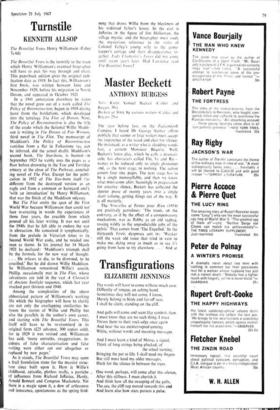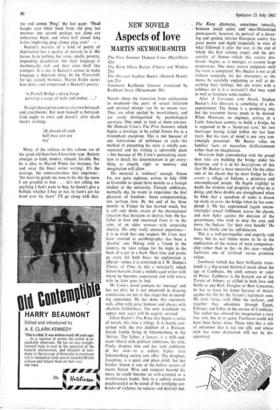Master Beckett
ANTHONY BURGESS
Beckett at Sixty by various writers (Calder and Boyars 25s) The year before last, on the Zeckendorff Campus, 1 heard Dr George Steiner affirm publicly that sooner or later writers must accept the impotence of the word and elect for silence. He instanced; as a writer who is shedding words fast, a certain Monsieur . Bequete. Well, Beckett's latest play, which he calls a dramati- cule, has characters called Flo, \ i and Ru -- names to be reduced only to single phonemes and, as the next stage, to nothing. The action covers four tiny pages. The next stage has to be a single monosyllable, and then we know what must come after. Seemingly in preparation for creative silence, Beckett has collected the shorter prose of twenty years into a single short volume, getting things out of the way. It is all masterly.
The Nouvelles et Textes pour Rien (1954) are positively garrulous: 'The trunk, on the contrary, as if by the effect of a compensatory mechanism, was as flabby as an old ragbag, tossing wildly to the unpredictable jolts of the pelvis.' That comes from 'The Expelled.' In the thirteenth Texte, dyspnoea sets in: 'Weaker still the weak old voice that tried in vain to make me, dying away as much as to say it's going from here to try elsewhere. . . .' And at
the end comes 'Ping,' the last gasp: 'Head haught eyes white fixed front old ping last murmur one second perhaps not alone eye unlustrous black and white half closed long lashes imploring ping silence ping over.' .f4- Beckett's mastery of a kind of poetry of deprivation has a quality of miracle in it His heroes have nothing but sores, smells, poverty, impending dissolution. but their language is rhythmically rich and their cries thrill like trumpets. It is not in Beckett's nature to make language a deprived thing. In the Festschrift for his sixtieth birthday, Martin Esslin shows how dense and compressed is Beckett's poetry: 'at Parnell Bridge a dying barge carrying a cargo of nails and timber....
Straight description conveys also two betrayals and crucifixions. But man himself is betrayed. God ought to exist and doesn't; after death there's nothing: 'all aboard all souls half mast aye aye nay' Many of the tributes in this volume are of the good-old-Sam-how-I-love-him type. Beckett emerges as kind, modest, reticent, lovable. But he is also, to Harold Pinter for instance, 'far and away the finest writer writing'. It's the courage, the remorselessness that impresses: 'the more he grinds my nose in the shit the more I am grateful to him . . . he's not selling me anything I don't want to buy, he doesn't give a bollock whether I buy or not, he hasn't got his hand over his heart.' I'll go along with that.































 Previous page
Previous page